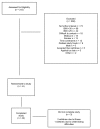The effect of Korean pine nut oil (PinnoThin) on food intake, feeding behaviour and appetite: a double-blind placebo-controlled trial
- PMID: 18307772
- PMCID: PMC2289823
- DOI: 10.1186/1476-511X-7-6
The effect of Korean pine nut oil (PinnoThin) on food intake, feeding behaviour and appetite: a double-blind placebo-controlled trial
Abstract
Certain free fatty acids have been shown to have potent effects on food intake and self-reported changes in appetite; effects associated with increases in the release of endogenous cholecystokinin (CCK) and glucagon like peptide-1 (GLP-1). In the current study, the effects of a Korean pine nut oil product, PinnoThin, at doses 2 g, 4 g and 6 g triglyceride (TG) and 2 g free fatty acid (FFA), on food intake and appetite were examined in a cross-over double-blind placebo-controlled randomised counter-balanced design in 42 overweight female volunteers. 2 g FFA PinnoThin, given 30 minutes prior to an ad-libitum buffet test lunch, significantly reduced food intake (gram) by 9% (F(4,164) = 2.637, p = 0.036) compared to olive oil control. No significant effect of PinnoThin on macronutrient intake or ratings of appetite were observed. Given the recent data showing that the TG form of PinnoThin may also reduce appetite by increasing CCK release, the lack of any effect of the TG form found in this study could be attributed to the timing of the dosing regime. Collectively, these data suggest that PinnoThin may exert satiating effects consistent with its known action on CCK and GLP-1 release, and previously observed effects on self-reported appetite ratings.
Figures
References
-
- Brown WJ, Williams L, Ford JH, Ball K, Dobson AJ. Identifying the energy gap: magnitude and determinants of 5-year weight gain in midage women. Obes Res. 2005;13:1431–1441. - PubMed
-
- Halton TL, Hu FB. The effects of high protein diets on thermogenesis, satiety and weight loss: a critical review. J Am Coll Nutr. 2004;23:373–385. - PubMed
-
- Halford JCG. What's new in the appetite suppressant field. A nutritional and behavioural perspective. Agro Foods Industry Hi-Tech. 2007.
Publication types
MeSH terms
Substances
LinkOut - more resources
Full Text Sources
Other Literature Sources
Miscellaneous


